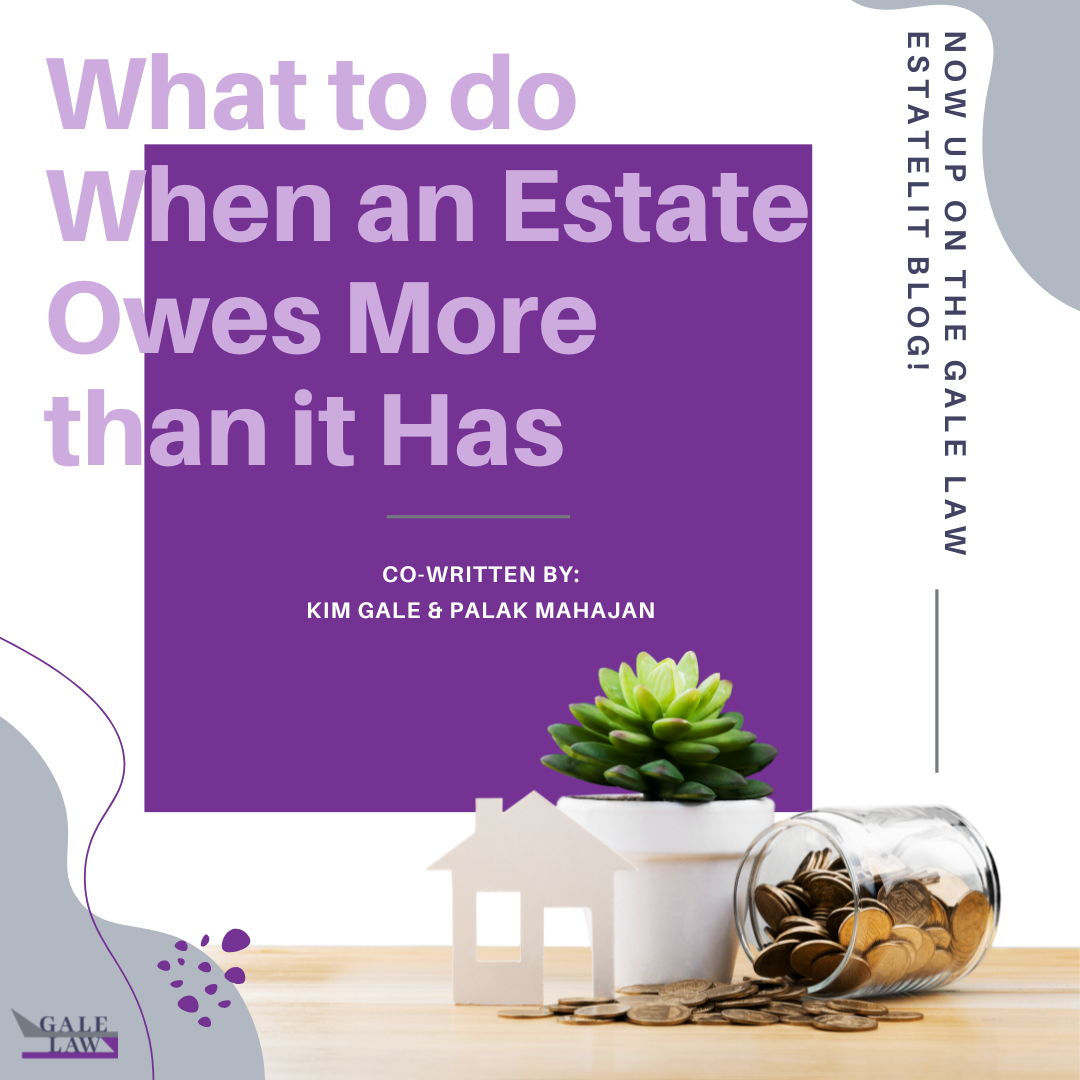
Co-written by: Kim Gale and Palak Mahajan
Losing a loved one is an emotional, overwhelming and turbulent time for everyone. This anxiety, coupled with the sudden responsibility to administer the estate of the deceased (if you have been appointed as the estate trustee) can be treacherous to navigate.
This can be particularly challenging when the liabilities of the estate are greater than the assets.
Duties of estate trustee in an insolvent estate
The duties and obligations of an estate trustee are multifold. The first and foremost responsibility of an estate trustee is to find, secure and review the will of the deceased if the deceased had one. Thereafter, the legally prescribed duties of an estate trustee are broadly to arrange the funeral, secure and appraise the assets of the deceased, apply for probate, (if required), pay taxes and other debts of the deceased, provide accounting to the beneficiaries and distribute the assets in the prescribed manner.
In situations when the liabilities of the estate exceed the assets, the estate would be considered an "insolvent estate." The estate trustee should consider whether they would simply pay the debts, for example, if there are sufficient funds for these debts (but nothing leftover remaining) or if it would be more prudent to file for bankruptcy of the estate.
Filing for bankruptcy
The Bankruptcy and Insolvency Act (R.S.C., 1985, c. B-3) (Act) stipulates that the trustee has to administer the estate and file for its bankruptcy. An insolvent estate is not automatically bankrupt, it must be formally declared bankrupt under the Act. This can be done so either by the creditors or the estate trustee.
The estate trustee would have to proceed with filing formal proceedings for bankruptcy of the estate. The court will then proceed with the bankruptcy proceedings under the Act, including appointing an official receiver.
Estate trustee absolved of duties
Once a trustee in bankruptcy is appointed, the estate trustee would be absolved of all his/her responsibilities and liabilities towards the administration of the estate as this is now the responsibility of the trustee in bankruptcy. This would also ensure that the estate trustee is not held personally liable for any mishaps with the administration of the estate as they have essentially "passed on the baton" for administering the estate.
Notwithstanding the utmost care and efforts that may be put in by the estate trustee to administer the estate, certain unanticipated claims may arise. Therefore, putting the estate into bankruptcy may be practically and legally the most viable way to administer the estate.
Many estate trustees might not be aware of the depth of legal responsibilities that comes with the administration of an estate. An insolvent estate poses greater risks to an administer as debtors have complicated rankings regarding who should be getting paid first.
Kim Gale is an estate litigation lawyer and principal of Gale Law, an estate litigation firm in Toronto. She can be reached at 416-868-3263 or kgale@localhost. She is the author and creator of the blog Law for Millennials - The Complete Beginners Guide to Law and is co-founder of diversity and inclusion group NCA Network. Patak Mahajan is an internationally trained lawyer with over five years of experience in disputes resolution and litigation in India. She is registered with the Bar Council of India since 2016 and is currently an L.L.M. candidate at Osgoode Hall Law School, York University.
She is a summer student with Gale Law, outreach and events co-ordinator with the NCA Network and the L.L.M representative of Asian Law Students Association (ALSA) of Osgoode 2022-2023.
The opinions expressed are those of the author(s) and do not necessarily reflect the views of the author's firm, its clients, The Lawyer's Daily, LexisNexis Canada, or any of its or their respective affiliates. This article is for general information purposes and is not intended to be and should not be taken as legal advice.
This article was originally published by Law360 Canada part of LexisNexis Canada Inc.
